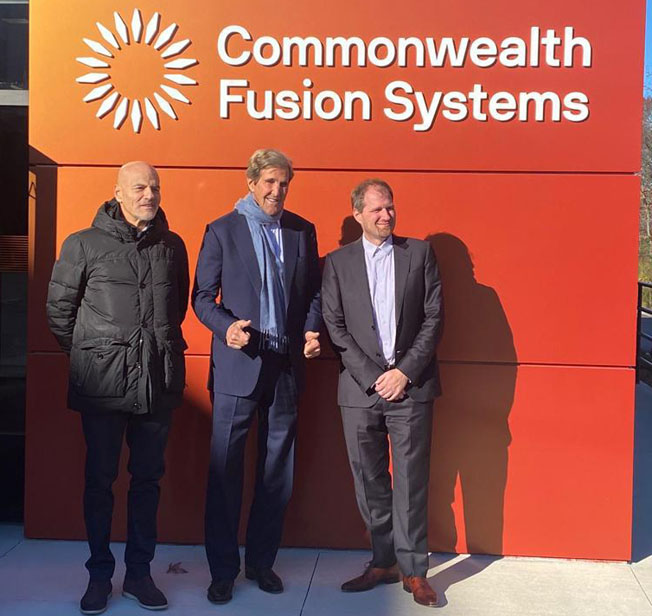
The United States Special Presidential Envoy for Climate, John Kerry, has this week visited Commonwealth Fusion Systems (CFS) corporate headquarters in Devens, Massachusetts, near Boston, together with CFS CEO, Bob Mumgaard and Eni CEO, Claudio Descalzi.
CFS, a spin-out of the Massachusetts Institute of Technology (MIT), is working to bring fusion power plants to market. Eni, a significant investor, and collaborator has played a key role in supporting CFS’s rapid growth since founding in 2018. CFS is currently constructing SPARC, projected to become the world's first magnetic confinement system to demonstrate scientific energy gain. SPARC will pave the way for ARC – envisioned to be the first commercial power plant capable of feeding fusion electricity into the grid, which is projected to be operational in the early 2030s.
This strategic visit remarks the importance of fusion as a safe, more sustainable and virtually inexhaustible energy that will generate a breakthrough in energy transition. The advantage of commercial fusion energy is that it is free of greenhouse gas emissions, firm and reliable, making it extremely attractive for the energy industry. The fusion energy process is also virtually inexhaustible because it uses as fuel a mixture of two isotopes of hydrogen, deuterium and tritium. Magnetic confinement technology uses powerful magnetic fields to insulate, power and maintain the fusion reaction.
United States Special Presidential Envoy for Climate John Kerry commented:
“Fusion energy is no longer just a science experiment. Benefitting from decades of investment from the Department of Energy’s world-leading Fusion Energy Sciences programs, it is now also an emerging climate solution. I will have much more to say on the United States’ vision for international partnerships for an inclusive fusion energy future at COP28, during an event on December 5”.
The visit to CFS by John Kerry and Claudio Descalzi follows a Technological Framework Agreement recently signed by Eni and CFS with the aim of accelerating the industrialisation of fusion energy. Eni was the first major energy company to believe and invest in fusion, which could make a major contribution to decarbonisation - once brought to industrial level - by providing large quantities of zero carbon energy. In detail, this collaboration aims at accelerating the industrial development of fusion power plants as well as a series of projects now under development that could include operational and technological support, technological development, project execution through the sharing of methodologies learned from the energy industry, as well as relationships with stakeholders.
Eni CEO Claudio Descalzi said:
“It is my distinct pleasure to be with John Kerry today, who is making an impressive work to accelerate concrete action for the energy transition globally. Eni’s commitment towards decarbonisation is strong, deep and irreversible and it is based on a transformation path that we’ve been undertaking for 10 years. Eni is lowering its total emissions on scopes 1, 2 and 3, and it will reach Net Zero in 2050. On one hand, we are working on our traditional energy production to lower its carbon content, for example significantly reducing our methane emissions; on the other hand, we are increasing progressively our low carbon products offer, growing both in renewables and biofuels production. But we are also looking to the future, investing in breakthrough solutions for the transition, like fusion energy that’s a viable future source of sustainable and virtually inexhaustible energy. We have an historic scientific collaboration with MIT, and we are a strategic investor in Commonwealth Fusion Systems: we are heavily investing in Magnetic Fusion technology with the aim to bring it to industrialisation and we value international and public-private collaborations to accelerate its commercialisation. We started here, in the unique US innovation ecosystem, whose approach should see as a model for other countries approaching in this technology. This is why we are proud today to share its progresses with a farsighted man like John Kerry is.”
CFS has the fastest pathway to commercial deployment of fusion energy. Today, CFS is manufacturing high temperature superconductor (HTS) magnets that are key to achieving net fusion energy in SPARC. With each passing week government officials, academics, and other industry leaders are coming to see SPARC first hand given the promise that fusion holds in transforming the global energy market and in solving the urgent climate crisis.
CFS CEO Bob Mumgaard said:
”U.S. Special Presidential Envoy for Climate John Kerry and Eni lead by Claudio Descalzi have long understood the prospect of what commercial fusion will mean to the world. They believe in the CFS mission to accelerate the path to commercialisation to combat climate change. With SPARC, CFS has the surest path to truly realise fusion energy on a timescale that will impact climate change. Through a coordinated global effort with leaders such as Eni, Mr. Descalzi, and Special Envoy Kerry, the best resources of the public and private sectors can be leveraged and scaled. We are positioned to innovate and deploy real solutions.”
For Eni and CFS magnetic confinement fusion has a central role among the technologies that can lead to the decarbonisation path as it will prospectively allow humanity to have a virtually inexhaustible supply of energy and without CO2 emissions, transforming the paradigm of energy generation forever.
 KEYFACT Energy
KEYFACT Energy